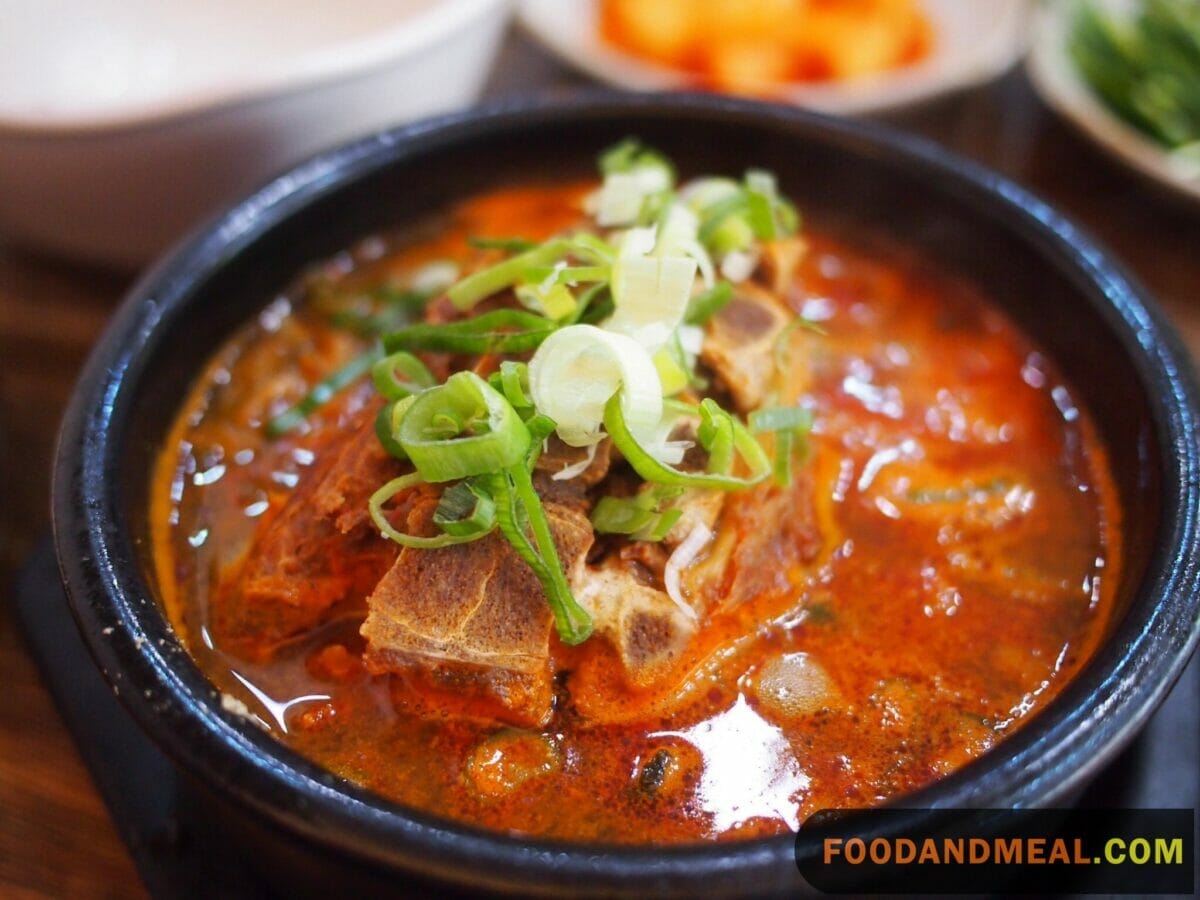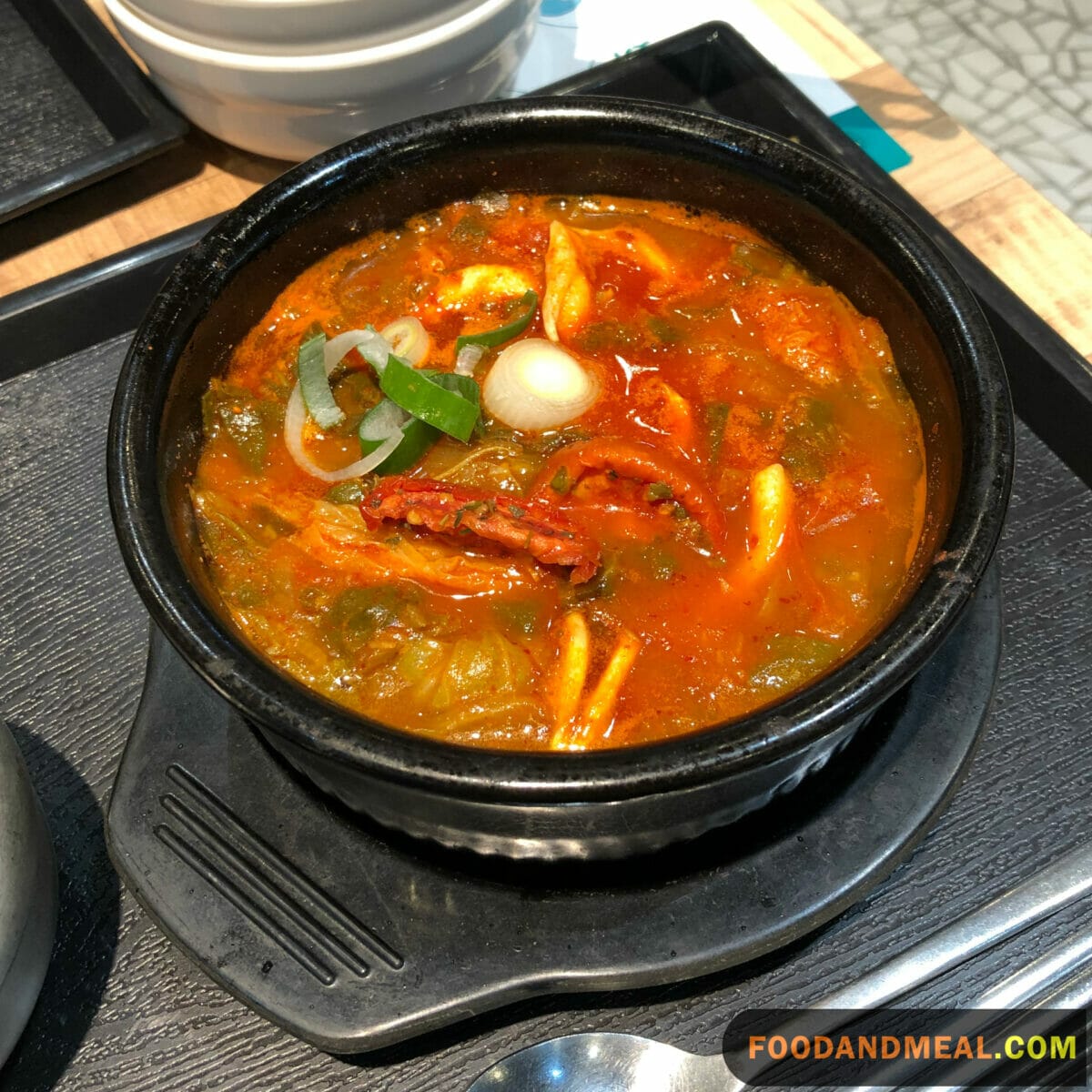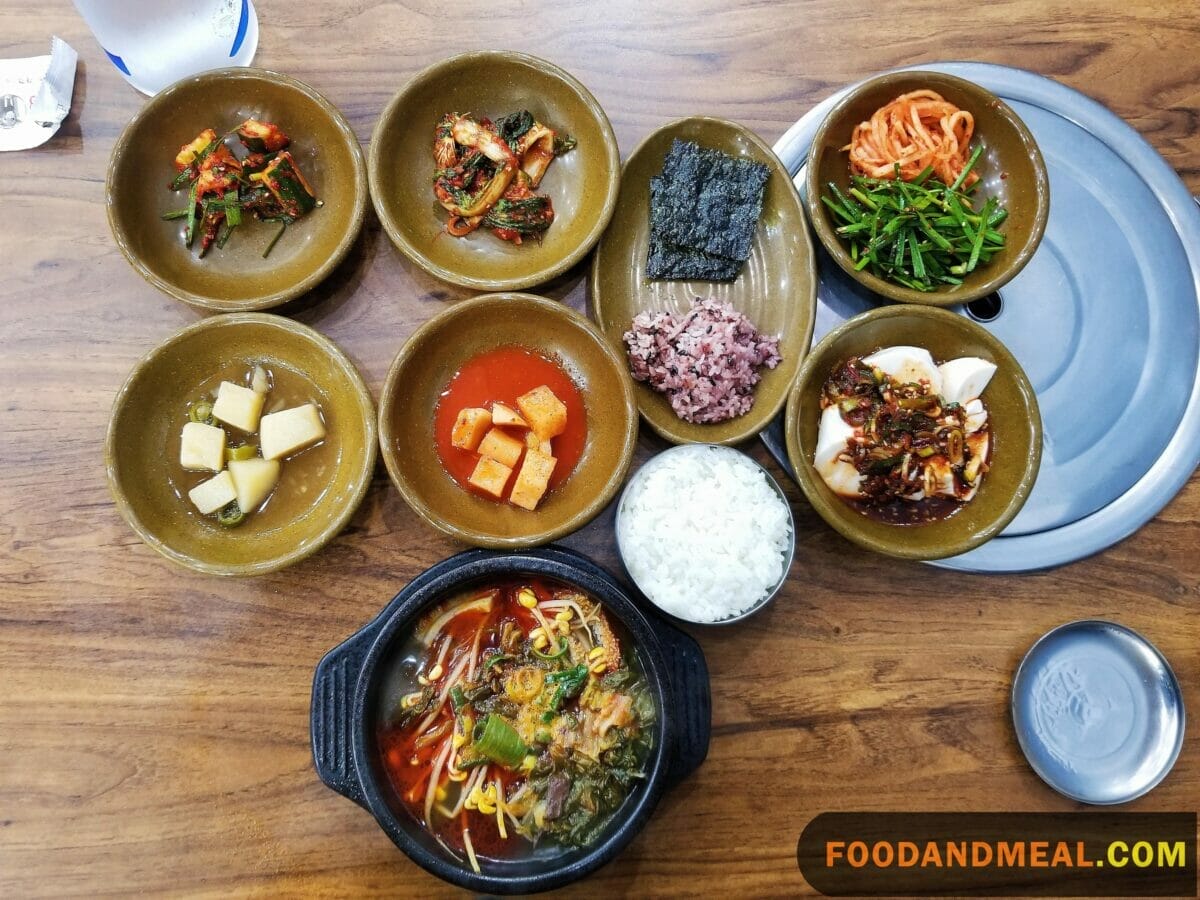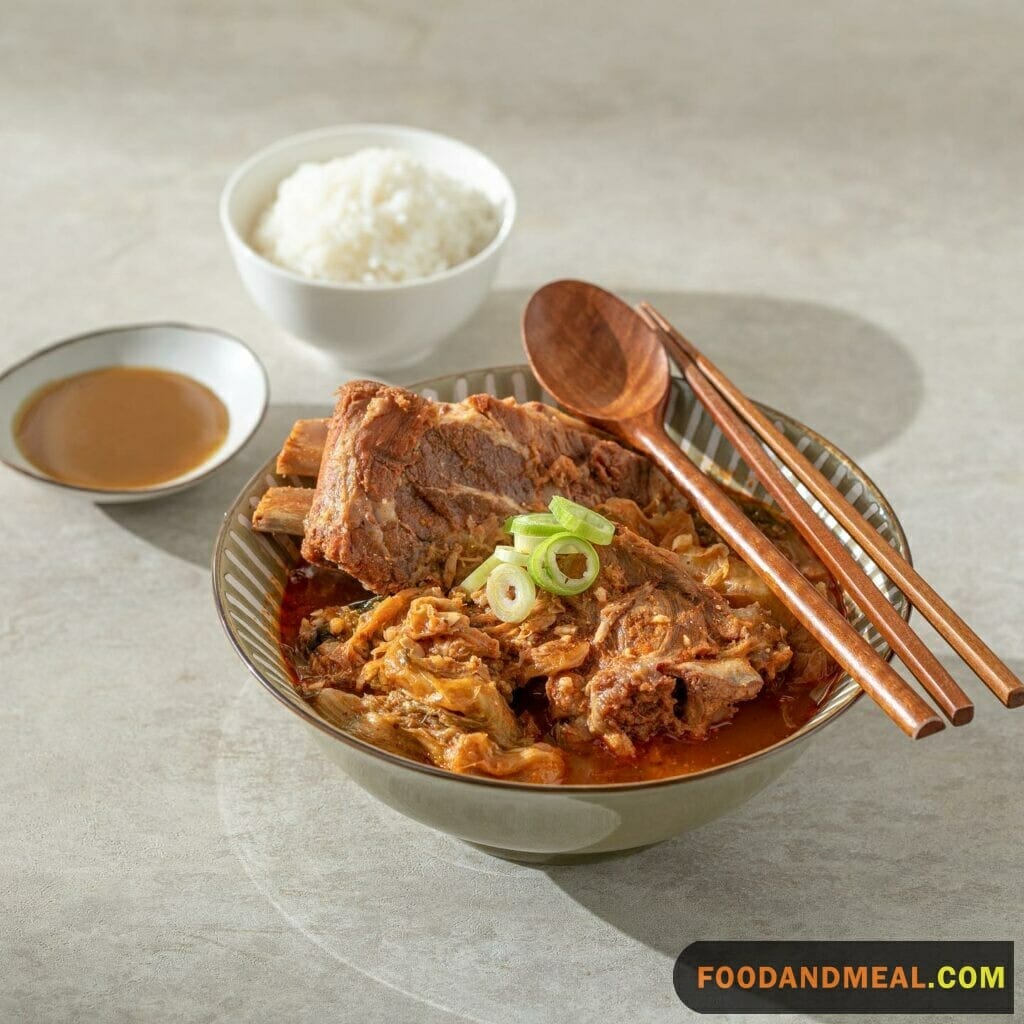As dawn breaks and the remnants of last night’s revelries linger a little longer than one might wish, the quest for solace often leads us to the comforting embrace of a warm kitchen. I’m Nazia from Food And Meal (https://foodandmeal.com), and I know that sometimes we all find ourselves in need of a culinary cure-all, a soothing remedy to rejuvenate after a night of overindulgence. It’s on such mornings that I find myself drawn to the stove to craft a restorative elixir—a Hangover Soup that promises to breathe life back into the weary.
In my own life, as moments of celebration sometimes tilt towards excess, I’ve discovered the grounding power this heartening soup can have. The mere thought of preparing it feels like an act of self-compassion, a gentle way to rekindle the body’s energy and restore balance. Its preparation is a tender choreography of slicing vegetables, simmering broths, and seasoning—a therapeutic process that signals to mind and body alike that recovery is on the horizon.
The beauty of Hangover Soup lies not just in its restorative properties but also in the emotional connection it fosters. Each ingredient is chosen with care, each step taken with mindfulness. Taking the time to create something nourishing is a testament to our resilience—an acknowledgment that despite yesterday’s merriment turned misty-eyed, today offers a chance to heal and replenish.
Every culture has its version of Hangover Soup, a testament to the universal need to find comfort in food after a night of indulgence. The recipe I’m about to share is steeped in warmth and laden with nutrients, designed to detoxify and satisfy. It’s a bowl of solace that speaks to tradition and understanding, a collective knowledge passed through generations who knew well the merry dance of festivity and recuperation.

Korean Hangover Soup Recipe

Korean Hangover Soup
Equipment
Ingredients
- 1/2 tablespoon toasted sesame oil
- 1/4 cup sliced beef
- 2 tablespoons minced garlic
- 1 tablespoon soup soy sauce
- 1/4 cup kimchi, rinsed, drained, and chopped
- 3 cups Anchovy Stock (here) or vegetable stock
- 1 cup bean sprouts
- 1 cup chopped kale
- 2 teaspoons gochugaru
- 2 teaspoons sesame seeds
- 1/2 cup chopped scallions, for garnish
Instructions
- In a stockpot, warm the sesame oil over medium-high heat. Add the beef and garlic and sauté for about 3 minutes.
- Add the soup soy sauce, kimchi, and anchovy stock and bring to a boil.
- Add the bean sprouts, kale, and gochugaru. Cover and simmer for about 15 minutes.
- Add the sesame seeds and cook for 1 more minute.
- Serve the soup ladled into 4 individual bowls and garnished with chopped scallions.
Video
Notes
Nutrition
© Food And Meal
This website provides approximate nutrition information for convenience and as a courtesy only. Nutrition data is gathered primarily from the Spoonacular Database, whenever available, or otherwise other online calculators.
Korean Hangover Soup Cooking Tips

First and foremost, start with a rich broth; this is the foundation of your Hangover Soup and the vessel to carry all the delightful flavors you’ll add later on. Whether you choose chicken, beef, or a robust vegetable stock, ensure it’s simmering gently, ready to infuse everything it touches with depth and comfort.
Hydrate and season thoughtfully. Dehydration is a common sidekick to hangovers, so the liquid base of your soup is vital. Add a modest pinch of salt, for electrolytes, and perhaps a slice of ginger or lemon—their aromatics have a way of piercing through any feelings of sluggish instruction to awaken your senses gently.
Vegetables are your friends. Not only do they impart essential vitamins and minerals into your soup, but their textures and colors also serve to lift your spirits. Consider leafy greens like spinach or kale; they wilt tenderly into the broth, offering up their nourishing goodness with every spoonful.
Protein is pivotal—your body is seeking sustenance. Gentle pieces of poached chicken, soft cubes of tofu, or even a carefully cracked egg that poaches right there in the broth—these are all kind-hearted ways to introduce protein without overwhelming a sensitive system.
Resist the urge to over season. A tumultuous stomach will thank you for the mercy of simplicity. Allow the natural flavor of your quality ingredients to shine through. There is profound beauty in the taste of clear broth and tender vegetables that require little adornment.
Finally, remember to cook slowly and with intention. There’s no rush to mend the aftermath of a lively evening. Let the soup bubble away softly, reducing any bitter urgency to mere whispers of steam that rise from the pot—an aromatic reassurance that restoration is underway.
Serving Suggestions for Hangover Soup

Serving the Hangover Soup becomes a therapeutic experience with carefully curated accompaniments. Enhance the comforting qualities of the soup by pairing it with scallion kimchi for a zesty kick, or opt for the heartiness of bacon enchiladas for a satisfying hangover remedy. Top the soup with soft-boiled eggs to add a creamy richness that complements the flavorful broth. For a refreshing touch, accompany the meal with an easy iced coffee to awaken the senses. Conclude the indulgent journey with a slice of marble pound cake, offering a sweet contrast to the savory soup and completing the hangover recovery with a delightful treat.
FAQs on Hangover Soup Korean

- What’s the main ingredient that aids in hangover relief? The primary hangover-combatting ingredient is the bone broth, rich in amino acids and minerals, which helps detoxify the liver and replenish lost nutrients.
- Can I make a vegetarian version of Hangover Soup? Absolutely! While traditional recipes use beef bone broth, a rich vegetable or mushroom broth can be a wonderful base for a vegetarian version.
- How can I store leftover soup? If you have leftover Hangover Soup, store it in an airtight container and refrigerate. It should remain fresh for up to 3 days. If needed longer, consider freezing it for up to a month.
- My soup lacks depth. What can I add? A splash of soy sauce or fish sauce, or a bit of aged kimchi, can elevate the flavor profile. Additionally, ensure you simmer the broth long enough to extract the bone’s nutrients and flavors.
- Is there an ideal time of day to consume Hangover Soup? While it’s traditionally a morning remedy, its comforting nature makes it suitable for any time of day, especially during colder months.
Conclusion
As we come to the end of our gentle journey with the Hangover Soup, I hope it has offered you a lantern in the foggy morning-after. It’s not just about the nourishment we seek for our bodies but also the peace we yearn for our souls. At Food And Meal, each recipe is more than a set of instructions; it’s an invitation to a ritual of self-care, a guide to a meal that acts as a balm for the spirit as much as it does for the physical self.
The Hangover Soup, with its tender vegetables and soothing broth, along with the thoughtful accompaniments we’ve discussed, is a harmonious ensemble crafted out of empathy and understanding for those delicate mornings. Serving it, I believe, doesn’t just satiate hunger; it mends the sense of well-being that might have been swayed by yesterday’s indulgence.
Remember, food is not just sustenance; it’s a story we tell ourselves and others, a narrative of recovery, love, and sometimes, a necessary indulgence. As Nazia from Food And Meal, it has been my pleasure to share this soul-warming recipe and insights with you. May your spoon always be ready to stir through the remedies of tradition, taste, and time—each mouthful a step closer to balance and vigor.
Thank you for joining me in this culinary embrace. Until the next shared meal or thoughtful tip, take care, be kind to yourself, and keep the hearth of your kitchen—and heart—warm.
Hi! I'm Nazia of ‘Nazia Cooks’, a self-taught baker and cook residing in Chennai. Rooted in the rich South Indian culinary landscape, my palate has expanded to embrace global flavors. I revel in crafting fusion dishes, melding traditions to birth unique tastes.



